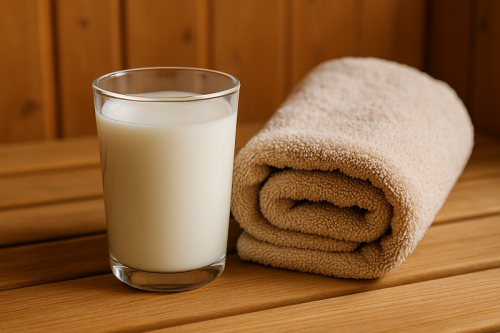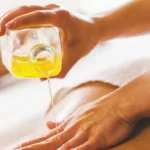Engaging in wellness practices like visiting a sauna or receiving a massage has long been valued for promoting relaxation, recovery, and overall health. But did you know that what you consume around these sessions can affect how your body responds?
In many cultures—especially in places like Finland and Japan—drinking milk before or after sauna use or massage is a common tradition. This isn’t just cultural; there are nutritional and physiological reasons for pairing milk with wellness routines. In fact, experts suggest that drinking milk after sauna or before a massage can improve hydration, aid muscle recovery, and enhance the body’s relaxation response.
Table of Contents
Nutritional Benefits of Milk
Milk is rich in key nutrients that support recovery and balance:
🥛 Hydration & Electrolytes – Milk has a high water content and contains potassium and sodium, which help replenish electrolytes lost during sweating in a sauna. This makes it a powerful post-sauna nutrition drink. Proper hydration is critical after heat exposure, and milk helps restore the body’s natural fluid balance more effectively than water alone.
💪 Protein for Muscle Recovery – Whey and casein proteins in milk support muscle repair after relaxation or micro-stress to the muscles, such as during deep tissue massage or heat exposure. It’s one of the best natural muscle recovery drinks, providing both fast-absorbing and sustained protein to support recovery over time.
🦴 Calcium for Bone Support – Saunas can cause slight bone stress, similar to exercise. Calcium helps maintain bone strength, especially in those who are physically active or aging. It also plays a role in muscle contractions and overall musculoskeletal health.
😴 Tryptophan for Relaxation – This amino acid can enhance the calming effect of a massage or sauna and improve sleep quality afterward. Tryptophan supports serotonin production, which influences mood and sleep cycles—both vital for post-session recovery.

Drinking Milk After Sauna Sessions
Saunas promote detoxification through sweating, which leads to fluid and mineral loss. Here’s how milk helps after a sauna:
- 🧊 Cools the body down – Cold milk helps your body regulate temperature post-sauna. The chilled temperature is soothing to internal systems and can help lower core body temperature more gently than water alone.
- 💧 Rehydrates efficiently – The combination of water, natural sugars, and electrolytes in milk makes it more effective than water alone for sauna hydration recovery. Studies show that milk provides longer-lasting hydration than traditional sports drinks.
- 🧘♂️ Soothes the system – Some people experience digestive stimulation from sauna use. Milk can calm this response by coating the stomach and reducing acidity, helping your body settle into a post-sauna recovery state.
Cultural Insight
In Finland, it’s common to drink a glass of milk or enjoy yogurt after a sauna. This isn’t just tradition—it’s rooted in recovery science. Studies show that milk can outperform some sports drinks in rehydration, making it ideal for post-sauna nutrition.

Drinking Milk Before a Massage
Drinking milk before a massage can set your body up for a more effective session:
- ⚡ Sustains energy – The lactose in milk provides slow-release energy for longer or more intense massages. Ideal for pre-massage nutrition, especially if your massage includes muscle work or deep pressure techniques that require metabolic energy.
- 🤸 Improves muscle elasticity – Hydration and protein contribute to more supple, relaxed muscles, enhancing massage effectiveness. Muscles that are well-nourished and hydrated are less likely to cramp or feel sore after the session.
A small glass 30–45 minutes before your appointment gives your body time to begin absorbing the nutrients. This is especially helpful before physically demanding or deep tissue sessions.

Practical Tips for Wellness Integration
Want to try combining milk with your sauna or massage routine? Here’s how to get started:
⏱️ Timing Matters – After a sauna, drink milk right after to restore fluids. Before a massage, aim for 30 minutes prior. Timing helps your body take full advantage of milk’s nutrients during recovery or muscle work.
🥄 Choose the Right Type – Whole milk offers a balance of fat, protein, and carbs, but lactose-free, goat, or fortified plant-based milks can be good options too. Just be sure your alternative is enriched with calcium and vitamin D for similar benefits.
🥛 Stick to One Serving – 8 ounces (240 ml) is enough to feel the effects without feeling too full. That’s the sweet spot for maximizing milk and wellness benefits while avoiding digestive discomfort during your session.

Bottom Line
Pairing milk with your sauna or massage session isn’t just tradition—it’s a simple, nutrient-rich way to support your body’s natural recovery processes. Whether you’re looking to rehydrate, relax more deeply, or support muscle recovery, adding milk to your wellness routine might be a small habit with big impact.
With strong ties to traditional practices in Finland and Japan, and support from modern nutrition science, drinking milk after a sauna or before a massage is one of the easiest ways to enhance your overall wellness experience.
📖Read also:
References
- Finnish and Japanese milk traditions – Enjoy Onsen
- Milk’s hydrating properties – EatingWell
- Milk and protein benefits – Healthline
- More on milk and calcium – Healthline
- Learn more about tryptophan – Verywell Health
⚠️ Disclaimer:
This article is for informational purposes only and does not constitute medical advice. Always consult with a licensed healthcare provider or certified massage therapist before beginning any new treatment, especially if you have pre-existing health conditions or concerns.













Your blog is a true hidden gem on the internet. Your thoughtful analysis and engaging writing style set you apart from the crowd. Keep up the excellent work!
I wanted to take a moment to commend you on the outstanding quality of your blog. Your dedication to excellence is evident in every aspect of your writing. Truly impressive!
Your blog has quickly become one of my favorites. Your writing is both insightful and thought-provoking, and I always come away from your posts feeling inspired. Keep up the phenomenal work!
Mind = blown! 🌟 This is exactly the comprehensive breakdown I needed. Your expertise shines through in every paragraph. Thanks for sharing such well-researched content.
“Outstanding post! The research quality and clarity blew me away. The way you’ve structured each point shows your deep understanding of the topic. I’ve learned so much from your expert insights.